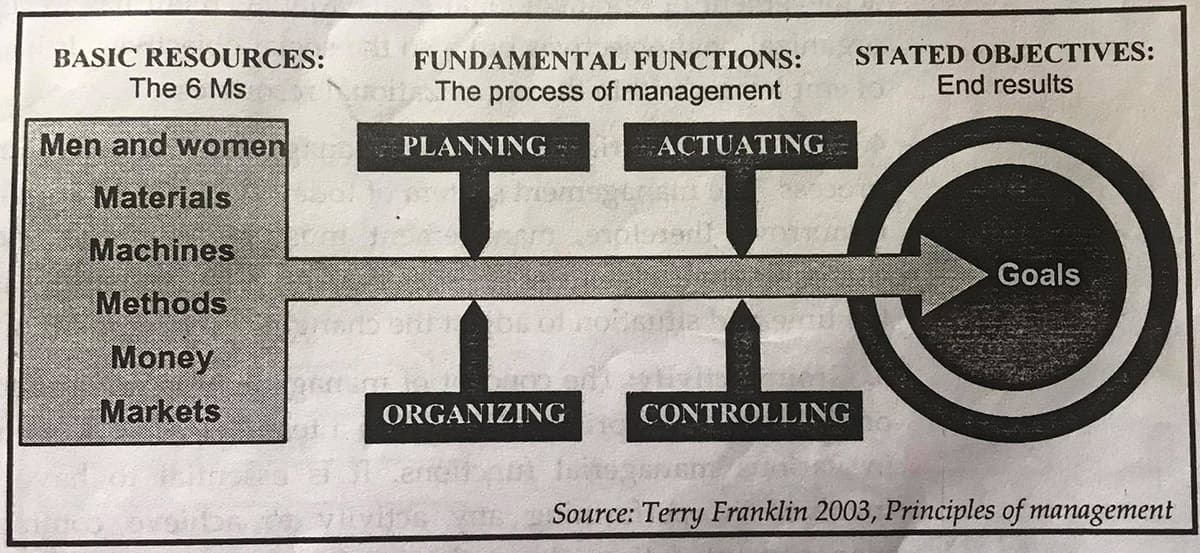Introduction to Management: Concept and Definition of Management
Many businesses fail in the first few years of operation. In almost all these cases managerial incompetence and inexperience are the causes of the failure. The cost of poor management is great for individuals and the nation’s economic stability. Not only are financial and physical resources get wasted when the business failed, but individuals often suffer from psychological damage. Business failure can be avoided only through good management practices, and this is a reason why management is a subject of increasing importance.
CONCEPT OF MANAGEMENT & DEFINITIONS OF MANAGEMENT
The national economy comprises both large and small organizations. In these organizations, people work together to accomplish goals that are too complex or large in number to be achieved by a single individual. Throughout life, people have to interact with a variety of organizations such as hospitals, banks, schools, businesses, colleges, universities, and many government agencies. The most significant factor in determining the quality of performance and success of such organizations is the success of its management.
Why are some managers successful, while others are not? This question requires a completed answer; we should examine a variety of factors that influence managerial success.
For now, we may simply say that successful managers are those who can carry out effectively the basic functions of management. We should also note that successful managers foster the cooperation and goodwill of others inside and outside the organization. Managers must work through others to achieve success.
All activities performed by the manager to get things done through others is known as management.
In other words, management is to manage human and other resources tactfully for the achievement of organizational goals. It is universal in all organized activities. It is an exercise of harmonizing men, money, machines, materials, and methods towards fulfilling the defined objectives. People associated with an organization should co-ordinate and support each other to devote their efforts to achieve organizational goals.
DEFINITIONS OF MANAGEMENT
There are as many definitions of management as there are books on the subject; some of them are as follows:
According to Koontz Q Donnel, “Management is the art of getting things done through and with people in formally organized groups.”
According to Harold Koontz & Heinz Weinrich, “Management is the process of designing and maintaining an environment in which individuals, working together, in groups, efficiently accomplish selected aims.”
According to James L Lundy, “Management is principally the task of planning, coordinating, motivating and controlling the efforts of others towards a specific objective.”
According to George R. Terry & Stephen G. Franklin, “Management is a distinct process consisting of activities of planning, organizing, actuating and controlling performed to determine and accomplish stated objectives with the use of human beings and other resources.”
According to Ricky W. Griffin, “Management, it is a set of activities (including planning and decision making, organizing, leading and Controlling) directed at an organization’s resources (human, financial, physical, and information ) to achieve organizational goals efficiently and effectively.”
According to Ivancevich, Donnely & Gibson, “Management is the process undertaken by one or more persons to coordinate the activities of other persons to achieve results not attainable by anyone person acting alone.”
Most of the above definitions of management do share a Common idea- Management is Concerned, with the accomplishment of organizational objectives through the efforts of other people. Thus, management may be defined as the process of planning, organizing, influencing/directing and controlling to accomplish goals through the proper coordination of humans and other resources as shown in the following figure.

In conclusion, management is the process by which managers direct and control other people to concentrate and balance their efforts to efficiently accomplish predetermined goals within the prevailing environment.
Read: Nature and Characteristics of Management – Principles of Management
Reference:
- Pouydal, Santosh Raj – Principles of Management, Ashmita Books Publishers and Distributors – Kathmandu
- Pradhan, Gopal Man – Principles of Management, Ashmita Books Publishers and Distributors – Kathmandu
- Bhandari, Kedar Prasad – Principles of Management, Ashmita Books Publishers and Distributors – Kathmandu
